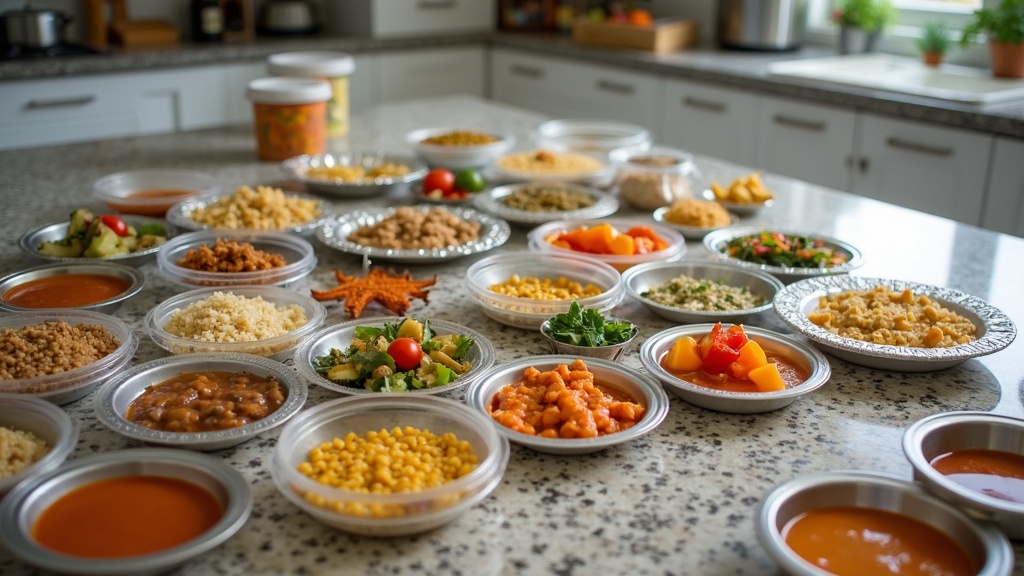Batch cooking is one of those kitchen game plans I reach for when life gets busy, and saving both time and money feels pretty important. The whole idea is simple: making a bunch of food at once so you can enjoy home-cooked meals while skipping most of the daily prep hassle. I’ve found that this approach not only makes weeknights way easier but can actually help me stick to a grocery budget and eat healthier, too. If you’re thinking about giving batch cooking a shot, here’s what you need to know.

How Batch Cooking Works
Batch cooking basically means you prepare larger portions of food at one go, then store them for later. You can keep the extra meals in the fridge or freezer. Some folks call it meal prepping, and while there’s a lot of overlap, with batch cooking you don’t have to stick to any single cooking style or hard schedule. You might make several complete meals, or just prep separate components that you can mix together later in the week.
Getting started with batch cooking doesn’t mean you have to spend your whole Saturday in the kitchen. Sometimes I double a recipe I’m already making for dinner and stash the extra away. Other times, I’ll prep a batch of ingredients or sides when there’s a free hour on the weekend. It’s about finding what fits your routine and making things run smoother.
Three Ways to Batch Cook
There’s no strict rule for batch cooking. There are just a few styles that most people lean toward, depending on their personal routines. Each has its perks, and I find myself switching things up based on my mood, my schedule, or even what my freezer can handle. Here’s a look at the main types:
- Fully Cooked Meals: Cook now, eat later. Make crowd-pleasers like lasagna, chili, breakfast casseroles, or baked enchiladas. Store the food in meal-sized portions, then reheat when you want a quick dinner.
- Freezer Meal Prep: Prep now, cook later. This means chopping and assembling raw ingredients—like marinating chicken or tossing veggies in a sauce—then freezing them uncooked. When you’re ready, everything goes straight from the freezer to oven, Instant Pot, or slow cooker.
- Batch Meal Components: Cook or prep basics like rice, beans, roasted veggies, or grilled chicken, then store in separate containers. These building blocks help you toss together different meals without starting from scratch each night.
Why Batch Cooking Saves Money
One of the biggest reasons I batch cook is that it really stretches my food dollars. Here’s how:
- Bulk Buying: When you know you’ll use a lot of something—like chicken breasts, rice, or onions—buying in bulk or grabbing larger packs on sale can cut grocery bills considerably.
- Fewer Impulse Buys: A kitchen packed with batch-cooked meals means I’m less likely to grab takeout or snacks after work.
- Lower-Cost Ingredients: Cooking from scratch lets me use basics like dried beans, which are less expensive than canned or pre-made versions. That saves money and usually tastes better, too.
- Using Seasonal Produce: Freezing in-season veggies and fruit when they’re at their cheapest helps me cut costs. I check local flyers and stock up to cook and freeze for later.
- Less Food Waste: Cooking large batches helps use up ingredients before they spoil and gives me a plan for leftovers, so nothing gets ignored and wasted at the back of the fridge.
How Batch Cooking Saves Time
Preparing several days’ or even weeks’ worth of food upfront stores up spare minutes and even hours for later on. I love being able to grab a homemade lunch or dinner from the fridge when I don’t have the energy or time to cook something new. Here are a few reasons batch cooking pays off with your schedule:
- Cook Once, Eat Multiple Times: Making a triple batch of soup, pasta, or stew is hardly more work than just cooking one, but it gives you extra meals ready to go.
- Streamlined Meal Planning: Keeping cooked proteins, grains, and veggies in the fridge takes away the stress of daily meal decisions. Sometimes, I build my week’s meal plan around what I already have prepped.
- Works with Kitchen Appliances: A slow cooker, Instant Pot, or air fryer can handle big recipes without much attention—the perfect help if you know you’ll have a busy week.
- Saves Daily Cleanup: Doing prep in larger chunks means fewer dishes and less mess to handle every night. I just pull out what’s needed, heat, and serve.
Healthier Eating with Batch Cooking
Eating well is so much easier when there are home-cooked meals ready to grab, and that’s a huge perk I’ve found from batch cooking. Here’s why this works for me and a lot of people I know:
- Improved Meal Choices: With homemade meals in the freezer, I’m way less likely to swing by the drive-thru or grab something unhealthy after a long day.
- Nutritious Ingredients: Because I control what goes into my meals, it’s simple to add in extra veggies, cut down on sodium, or tackle food allergies with easy swaps.
- Freezing Keeps Things Fresh: Home freezing doesn’t ruin nutrients the way some canned or takeout options do, which keeps the food healthier for weeks or months.
- Built-in Portion Control: By splitting my batches into individual servings, I find it’s much easier to avoid overeating and stick to a routine that works for me.
Practical Tips to Make Batch Cooking Easier
- Work While You’re Cooking Anyway: Prepping extra servings while you’re already making dinner saves tons of effort—even if you don’t have a separate batch day.
- Make Extra Portions: Overestimate slightly. I always make a bit more than planned to ensure I have enough for the week or to freeze for later.
- Storage Matters: Use solid freezer containers or bags and label them with the name and date. This helps avoid science projects in the freezer and makes it easier to choose what to eat.
- Pick Freezerfriendly Recipes: Thick soups, curries, chilis, pastas, cooked grains, roasted veggies, stews, and nondairy sauces usually hold up best. Leafy salads, fried foods, and some potatoes can get weird after freezing.
- Don’t Forget the Sides: Batchcooked simple sides like rice, quinoa, or roasted veggies. Having these handy makes building meals easy throughout the week.
The Best Foods for Batch Cooking
Certain foods are just made for batch cooking. Here are a few of my favorite options that never let me down:
- Soups and stews (chicken noodle, lentil, black bean, beef barley)
- Grains (brown rice, quinoa, farro, barley)
- Cooked legumes (chickpeas, pinto or black beans, lentils)
- Chili, curry, and pasta bakes
- Homemade breakfast eats (oatmeal bake, waffles, muffins, egg muffins)
- Freezerfriendly cooked veggies (roasted broccoli, peppers, sweet potato cubes)
- Lean proteins (baked chicken, turkey meatballs, shredded pork or beef)
- Nondairy based sauces (marinara, teriyaki, coconutcurry sauce)
Good to Know Before You Start
- Freezer Space: Make sure you’ve got room in your fridge or freezer before you cook up huge portions. Sometimes, I plan my batches by checking what containers are available and how much space I have.
- Food Safety: Chill cooked foods before freezing and avoid overfilling your containers. Defrost meals in the fridge for best results.
- Rotate Stock: Eat older meals first and keep new batches at the back so nothing turns into mystery ice in your freezer.
- Spice Things Up: Double-check your seasoning. Some flavors mellow out a bit after freezing and reheating, so sometimes I add extra spice before eating.
Frequently Asked Questions
What if I don’t have a big freezer?
Batch cooking doesn’t require a giant freezer. Cooking a little extra dinner to eat for lunch, or prepping just a couple meals ahead, totally counts. Use your fridge for smaller batches and aim to finish them within 3-4 days.
How long do batch-cooked meals last?
Most cooked meals are best for 3-4 days in the fridge and 2-3 months in the freezer. Soups, chilis, and stews tend to last the longest. Labeling really helps keep things organized.
What’s the best way to start?
Pick a favorite recipe that freezes well and double it on your next cooking night. Or pick one protein, like a roasted chicken or a pot of beans, and prep a few ways to use it through the week.
Key Takeaways from Batch Cooking
Batch cooking is flexible. There isn’t just one way to do it, and that’s a good thing. I focus on whatever fits my life, whether that’s doubling dinner once or twice a week or using an occasional weekend to fill the freezer. Any move toward batch cooking can add up to more free time, less stress, and a bit more money saved. Plus, having home-cooked meals always on hand is a great feeling.
